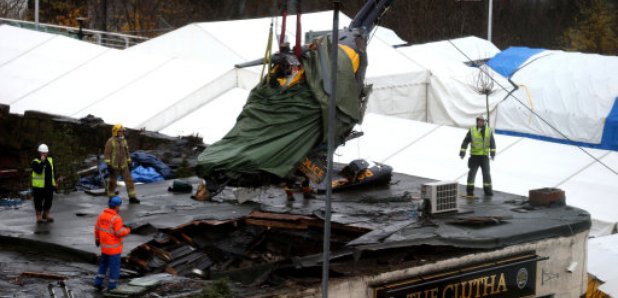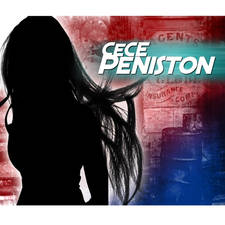No smell of fuel at Clutha crash scene, inquiry told
18 April 2019, 16:48 | Updated: 18 April 2019, 16:51

There was no smell of fuel or any evidence of a leak at the scene of a helicopter crash in which 10 people were killed, an expert has said.
Robert Vickery, a senior inspector at the Air Accidents Investigation Branch, arrived at the scene at the Clutha pub in Glasgow at 9am, just hours after the crash on Friday November 29, 2013.
He told the fatal accident inquiry (FAI) into the crash that he assembled a team and got on the first available flight to Glasgow, where they were met by police.
After a meeting in Govan, he arrived on site at 9am reporting "no smell of fuel or leakage".
Sean Smith QC, for the Crown, asked if there was an "extraction of fuel from the helicopter on December 2 on site while it was still suspended" over the pub.
Mr Vickery replied this was correct, also reaffirming there was 95 litres (76 kilogrammes) of fuel in the main tank while one supply tank had half a litre in it.
Mr Smith asked: "Did you send samples of the fuel for analysis?"
Mr Vickery told the inquiry they did "but not immediately after recovering the fuel", which was extracted into clean containers.
However he said the "quantity we had (from the supply tanks) was too little for a proper analysis".
A five-litre sample was sent from the main tank to the AAIB headquarters in Farnborough, along with flight reference cards "present in and around the aircraft in a state of disruption", according to Mr Vickery.
The wreckage was also taken to a hangar in Farnborough - arriving a day after the fuel had been extracted.
No contamination was found in the fuel containers, according to an independent test body, with Mr Vickery saying cameras were inserted in the tank of the helicopter during their own tests.
He was also asked if water contamination could have occurred through pressure washing, which happened on two occasions in the weeks before the crash: November 2, 2013 at 6,266 hours of flying; and on November 17/18 at 6,309 hours of flight.
Donald Findlay QC, representing the family of Robert Jenkins, one of the victims in the pub, asked: "Is there any indication contamination had any part to play in the demise of this aircraft?
Mr Vickery said: "No indication," before Mr Findlay then asked: "Would you have expected to be able to find evidence to back that up?"
The witness said the throughput of fuel is "quite rapid" for a small helicopter, adding with the "dynamic machine and rate of consumption you would expect to see a little but barely detectable".
He added that all AAIB investigations are carried out based on evidence, and that speculation and assumptions are "bad for the aviation industry".
Shelagh McCall QC, for the fiancee of helicopter pilot David Traill, asked if the aircraft was "lifted out of the Clutha pub at the same angle it came to rest", to which Mr Vickery replied: "Yes."
When asked why that was the case, he said: "I didn't want the helicopter to disintegrate any further than it had already."
He also said he wanted the fluids to "stay where they were", knowing none had "spilled into the pub".
Mr Vickery added he "wanted to have as much evidence as possible", and when Ms McCall asked if he was confident the fuel levels were the same level as when the aircraft crashed, he said: "Yes."
Mr Vickery said the only components he removed at the scene were the tail rotor blades, while everything else was taken to Farnborough by lorry.
The helicopter had been returning to its Glasgow base when it crashed through the roof of the pub, with low fuel warnings calculated to have activated as it approached Bothwell, South Lanarkshire, about 11 miles to the south-east.
More than 100 people were inside the venue and seven of them were killed in the crash, while the pilot and two helicopter crew also died.
The inquiry, before Sheriff Principal Craig Turnbull, continues at Hampden Park.






















